WMG News
WMG Professor joins Clean Growth Leadership Network
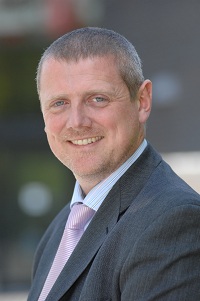 Head of WMG’s Sustainable Materials and Manufacturing Research Group, Professor Kerry Kirwan, has been appointed as a Fellow to the Clean Growth Leadership Network (CGLN).
Head of WMG’s Sustainable Materials and Manufacturing Research Group, Professor Kerry Kirwan, has been appointed as a Fellow to the Clean Growth Leadership Network (CGLN).
The CGLN is committed to economic growth for all whilst substantially reducing carbon emissions. The world-class network is made up of Founders, Fellows, Partners and Members united in their commitment to transform to a global clean economy.
Professor Kirwan explains: “I am delighted to have been appointed as a Fellow of the Clean Growth Leadership Network – the opportunity to work with some of the UK’s leading thinkers and practitioners tackling critical issues on the climate change agenda is hugely exciting. I’m really looking forward to introducing them to our research here at WMG and the wider University.”
Professor Kirwan is a specialist in circular economy, sustainable materials, polymer processing and industrial applications. He has extensive experience of developing environmentally friendly materials for application within numerous industries.
Read more about WMG’s Sustainable Materials and Manufacturing research here: Sustainable materials and manufacturing (warwick.ac.uk)
WMG Professors help tackle Net Zero solutions ahead of COP26
Ahead of COP26, voices across the political spectrum and from a range of leading UK universities have come together to produce a unique collection of essays focusing on Net Zero solutions.
Each is co-written by an academic and a Parliamentarian and sets out the areas where work is still needed on climate policy and demonstrates how readily to hand many policy and technical solutions are. It showcases the strength of UK science and research and the level of cross-party support for climate action.
Two WMG Professors have produced essays as part of the series. Professor David Greenwood together with Lilian Greenwood MP, has written ‘Driving the electric vehicle revolution’, and Professor Kerry Kirwan has, with Ben Lake MP, written ‘Overcoming barriers to the circular economy’.
Caroline Lucas MP, Chair of the APPG on Climate Change, explains: “The APPG on Climate Change was founded to coincide with the passing of the 2008 Climate Change Act – a vote that achieved almost unanimous support from across the political spectrum. As current Chair of the APPG on Climate Change, I see great value in striving to maintain and build upon this cross-party consensus where possible. We won’t all agree on the necessary course of action in each sector. And we may not even agree on the speed or scale with which it is necessary to reduce emissions. But we share a common conviction that the climate crisis is a challenge that can and must be surmounted. Deeper engagement between parliamentarians and the scientific community is a vital step in ensuring that we do. It is in that spirit that I fully endorse the work that has gone into producing this collection of essays.”
 In his essay, co-authored with Lilian Greenwood MP, Professor David Greenwood, CEO of WMG High Value Manufacturing Catapult at the University of Warwick explains: “Whilst the coronavirus pandemic has resulted in devastating personal and economic impacts, it has also caused us to challenge some of our preconceptions. The public has experienced clean air as a result of reduced transport and industrial emissions. People have taken to their bikes in record numbers and with the trials of rental e-scooters there’s a real opportunity for them to replace car and public transport usage for short journeys - at least in good weather.
In his essay, co-authored with Lilian Greenwood MP, Professor David Greenwood, CEO of WMG High Value Manufacturing Catapult at the University of Warwick explains: “Whilst the coronavirus pandemic has resulted in devastating personal and economic impacts, it has also caused us to challenge some of our preconceptions. The public has experienced clean air as a result of reduced transport and industrial emissions. People have taken to their bikes in record numbers and with the trials of rental e-scooters there’s a real opportunity for them to replace car and public transport usage for short journeys - at least in good weather.
“These behavioural shifts, along with the persistent drivers of air quality and climate change reinforce the shift to EVs.”
 Kerry Kirwan, WMG’s Professor of Sustainable Materials and Manufacturing explains: “Given the continued focus on how we use our limited planetary resources, the potential for green business models and practices to help our economic recovery post-pandemic and the imminence of COP26, it is great to see such a breadth of collected thinking coming together in this publication – it was a really valuable exercise that I am very pleased to have been part of”.
Kerry Kirwan, WMG’s Professor of Sustainable Materials and Manufacturing explains: “Given the continued focus on how we use our limited planetary resources, the potential for green business models and practices to help our economic recovery post-pandemic and the imminence of COP26, it is great to see such a breadth of collected thinking coming together in this publication – it was a really valuable exercise that I am very pleased to have been part of”.
Read the report and essays in full here: https://www.policyconnect.org.uk/research/net-zero-exchanges-connecting-policy-and-research-climate-action
About the APPCCG
The All-Party Parliamentary Climate Change Group runs events and activities in parliament with the purpose of advancing understanding of policy issues surrounding climate change and enabling cross-party discussion and action on climate policy.
This is not an official feed of the House of Commons or the House of Lords. It has not been approved by either House or its committees. All-Party Parliamentary Groups, forums and commissions are informal groups of Members of both Houses with a common interest in particular issues. The views expressed in the webpages are those of the groups.
About Policy Connect
Policy Connect is a membership-based, not-for-profit, cross-party think tank.
We bring together parliamentarians and government in collaboration with academia, business and civil society to inform, influence and improve UK public policy through debate, research and innovative thinking, so as to improve peoples’ lives.
We lead and manage an extensive network of parliamentary groups, research commissions, forums and campaigns. We are a London living wage and disability confident employer and a Member of Social Enterprise UK, and have been operating since 1995. Our work focuses on key policy areas including: health & accessibility; education & skills; industry, technology & innovation; and sustainability.
We shape policy in Westminster through meetings, events, research and impact work.
Consortium established to tackle decarbonisation of cross-Channel ferry fleet
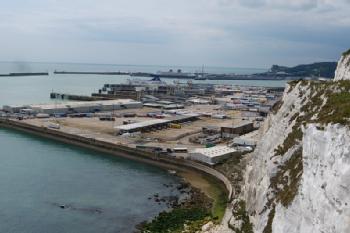 WMG at the University of Warwick is playing a key part in a new research project supporting the UKs pledge to achieve net-zero by 2050.
WMG at the University of Warwick is playing a key part in a new research project supporting the UKs pledge to achieve net-zero by 2050.
The seven-month project, entitled the Dover Clean Ferry Power, is a collaboration between the Port of Dover, P&O Ferries, WMG and Schneider Electric, led by Kent Business School at the University of Kent.
The project, which is part of a £20 million programme funded by the Department for Transport, will investigating the decarbonisation of the cross-Channel ferry fleet and in turn support the delivery of the Port of Dover Air Quality Action Plan.
Currently, Port of Dover vessels spend energy through in-harbour activity, open sailing and on-vessel services (such as heating, lighting and hospitality). Some vessels are hybrid; self-charging on-board batteries whilst in open sailing and then using the battery charge whilst in-harbour.
This project will model ferry operations at Dover to establish energy requirements, CO2 effects, air quality and running costs, using this to evaluate technical solutions for both ferries and the port, to accelerate the move to net zero. Insights gained may then have the potential to extend to cruise and cargo operators, as well as adaptation of experienced vessels.
Researchers and engineers at WMG High Value Manufacturing Catapult Centre will be undertaking all of the battery modelling and analytics, plus energy and CO2 modelling for the port of Dover and for vessels using the port– which will impact the locals as well as the environment more widely.
Phil Whiffin, WMG Head of Energy Applications Group, explains: “This project builds on our existing zero emission transport expertise and allows us to apply the MIMO (Multi-Input Multi-Output) modelling technique developed by Dr Andrew McGordon to investigate the complex operations of a port. It will support investment and operation decisions for Dover and the ferry operators and ensure the optimum strategy is in place to move towards net-zero. Dover is an essential trade gateway for the UK so this is a project of great strategic importance and we are pleased to be part of this great consortium.”
Simon Barnes, Project Manager and Funding & Partnership Development Manager within the University of Kent’s Research & Innovation Operations, said: ‘For the University of Kent, this new project builds on a previous successful work with the Port of Dover and is an excellent example of a collaborative project with the University, industry partners and consumers.
‘It is our unified aim to investigate potential avenues that can lead to reductions in carbon emissions as part of the national priority of net-zero. The University of Kent is dedicated to the endeavour through a series of initiatives, with the Dover Clean Ferry Power project as a prime example of the role we play regionally and in applying intensive research to vital national goals.’
ENDS
Notes to Editors
(1)
Clean Maritime Demonstration Competition
The Dover Clean Ferry Power Project is part of the Clean Maritime Demonstration Competition, funded by the Department for Transport and delivered in partnership with Innovate UK.
Announced in March 2020, and part of the Prime Minister’s Ten Point Plan to position the UK at the forefront of green shipbuilding and maritime technology, the Clean Maritime Demonstration Competition is a £20m investment from government alongside a further c.£10mfrom industry to reduce emissions from the maritime sector. The programme is supporting 55 projects across the UK, including projects in Scotland, Northern Ireland and from the South West to the North East of England. As set out in the Clean Maritime Plan (2019), Government funding has been used to support early-stage research relating to clean maritime. The programme will be used to support the research, design and development of zero emission technology and infrastructure solutions for maritime and to accelerate decarbonisation in the sector.
UK’s first live micromobility event takes place at WMG, University of Warwick
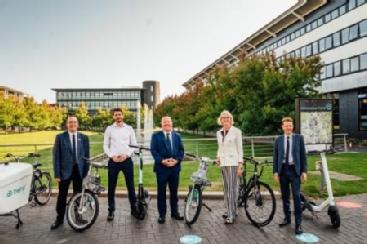 Micromobility refers to small lightweight efficient vehicles, which can be used to make short distance journeys.
Micromobility refers to small lightweight efficient vehicles, which can be used to make short distance journeys.
Types of micromobility vehicles we could see in our communities include bikes, hover boards, e-bikes and e-scooters. They can be used to save time, avoid congestion, remove parking conundrums and most importantly they use much less energy than a car, therefore contributing towards the Government’s zero-carbon goals.
The future of micromobility is incredibly topical, and to bring together all aspects of it WMG, at the University of Warwick, hosted the UK’s first live micromobility event, bringing together manufacturers in the micromobility sector, regional transport authorities; city councils and local authorities; Government agencies; research organisations and more.
The event not only saw the demonstration of many new exciting and existing micromobility vehicles from e-scooters to e-cargo bikes, but also outlined the opportunities for the UK to lead this sector in battery development and recycling, human factors and behavioural change, materials development and more.
It was also an opportunity to address the challenges the sector faces particularly around lack of infrastructure, policy and regulation.
Programme Director John Fox, from WMG, University of Warwick comments:
“Despite progress on electrification, transport emissions are actually increasing; Micromobility is essential if we are to achieve net zero emissions from this sector. With around 70% of journeys in the UK under 5 miles, Micromobility vehicles can have a huge impact on our emissions. They use typically 5% of the energy of an Electric vehicle to make trips, and their manufacture is also significantly less carbon-intensive.
“There are many other benefits Micromobility offers too, including air quality improvements, greater footfall in highstreets, and taking up much less space than a car to move the same number of people which releases more space in urban areas for other things.
“The conference touched on many of the key issues, including how to make Micromobility safe, accessible, integrated and attractive to new users, and highlighted the need for coordination between government, local authorities and industry. WMG announced our ‘UK Micromobility roadmap” to support this coordination, being developed with Cenex and being progressed through consultation and workshops sessions over the next six months, so watch this space!”
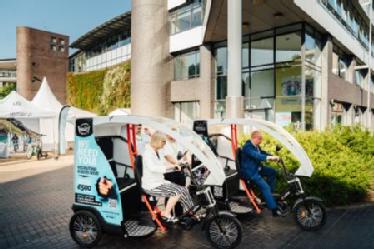 Margot James, Executive Chair of WMG, University of Warwick adds:
Margot James, Executive Chair of WMG, University of Warwick adds:
“As a leader in the electrification of transport, WMG, University of Warwick, is at the forefront in the development of high-quality, safe Micromobility vehicles. We are conducting trials with vehicle and infrastructure manufacturers on the Warwick campus, and supporting testing and development of new vehicles and systems in our labs. We’re also working closely with our local and regional authorities to make travel to and from our campus more sustainable, which includes supporting commutes by Micromobility with improved infrastructure and facilities on arrival.”
Andy Street, the Mayor of the West Midlands, said:
“As the home of the green industrial revolution, micromobility has a key role to play in the West Midlands as we look to tackle air pollution to help us reach our #WM2041 climate goal. Earlier this year we launched West Midlands Cycle Hire across eight towns and city centre - with more than 100,000 journeys taken on the bikes in just a few months – and we are also trialling e-scooters across the region, with more than 550,000 trips taken in Birmingham alone over the past year.
“But despite this successful start of both schemes we are of course always open to more innovation and improvement. That’s why it has been brilliant to have the micromobility industry here in the West Midlands, and it has been eye-opening to see what the industry has to offer.”
Councillor Jim O’Boyle, cabinet member for jobs, regeneration and climate change said:
“The innovation shown at the event is a result of the incredible engineering and manufacturing talent that can only be found in Coventry. Our city is leading the green industrial revolution and is at the heart of developing new forms of transport, from the micromobility solutions we have seen at the event to the innovative Coventry Very Light Rail, set to transform how many of us travel.
“It’s great to be with our partners at WMG to raise awareness of the ground-breaking work our city is contributing to the future of clean, green transport.”
ENDS
8 SEPTEMBER 2021
NOTES TO EDITORS
High-res images available at:
https://warwick.ac.uk/services/communications/medialibrary/images/july_2021/070921wuweb-12.jpg
Caption: A WMCA bike stand
Credit: WMG, University of Warwick
https://warwick.ac.uk/services/communications/medialibrary/images/july_2021/070921wuweb-247.jpg
Caption: People trialling some micromobility vehicles at the event
Credit: WMG, University of Warwick
https://warwick.ac.uk/services/communications/medialibrary/images/july_2021/070921wuweb-53.jpg
Caption: From left to right: Professor Robin Clark, Dean of WMG at the University of Warwick, John Fox – Programme Director for Micromobility at WMG, Cllr Jim O’Boyle - cabinet member for jobs, regeneration and climate change at Coventry City Council, Margot James- Executive Chair of WMG at the University of Warwick, Mayor of the West Midlands Andy Street
Credit: WMG, University of Warwick
https://warwick.ac.uk/services/communications/medialibrary/images/july_2021/070921wuweb-65.jpg
Caption: Margot James- Executive Chair of WMG at the University of Warwick with Mayor of the West Midlands Andy Street
Credit: WMG, University of Warwick
https://warwick.ac.uk/services/communications/medialibrary/images/july_2021/070921wuweb-62.jpg
Caption: From left to right: Cllr Jim O’Boyle - cabinet member for jobs, regeneration and climate change at Coventry City Council, Margot James- Executive Chair of WMG at the University of Warwick and Andy Street - Mayor of the West Midlands
Credit: WMG, University of Warwick
https://warwick.ac.uk/services/communications/medialibrary/images/july_2021/070921wuweb-69.jpg
Caption: Mayor Andy Street with some of the micromobility vehicles showcased
Credit: WMG, University of Warwick
https://warwick.ac.uk/services/communications/medialibrary/images/july_2021/070921wuweb-43.jpg
Caption: Margot James – Executive Chair of WMG, and Cllr Jim O’Boyle from Coventry City Council have a go in a Hail bike
Credit: WMG, University of Warwick
https://warwick.ac.uk/services/communications/medialibrary/images/july_2021/070921wuweb-50.jpg
Caption: Margot James – Executive Chair of WMG at the University of Warwick on a Hail bike
Credit: WMG, University of Warwick
https://warwick.ac.uk/services/communications/medialibrary/images/july_2021/070921wuweb-222.jpg
Caption: People at a West Midlands Transport Hub with a West Midlands Cycle Hire bike and a VOI e-scooter
Credit: WMG, University of Warwick
https://warwick.ac.uk/services/communications/medialibrary/images/july_2021/070921wuweb-72.jpg
Caption: A West Midlands Cycle Hire bike
Credit: WMG, University of Warwick
For further information please contact:
Alice Scott
Media Relations Manager – Science
University of Warwick
Tel: +44 (0) 7920 531 221
E-mail: alice.j.scott@warwick.ac.uk
WMG professor to lead research and network strand for £147 million Made Smarter Innovation programme

Recognised for her expertise in supply chain design and strategy, as well as process improvement and sustainability, Jan Godsell, Professor of Operations and Supply Chain Strategy at WMG, University of Warwick, has been appointed as a co-director of the research and network strand within the £147 million Made Smarter Innovation programme.
Taking on the UK Research and Innovation role with immediate effect, Professor Godsell will be working with the Economic and Social Research Council to lead the research and network strand of the programme alongside fellow newly appointed co-director Jillian MacBryde, Professor of Innovation and Operations Management at the University of Strathclyde.
Together they will look to expand the stakeholder community and research into a Made Smarter Network Plus on an initial five-month agreement working alongside the Challenge Director and programme team.
The Made Smarter Network Plus aims to bring together insights across the wider UK manufacturing sector, bolstering digital technology innovation opportunities in manufacturing through engagement and collaboration.
Commenting on her new role, Professor Godsell said:
“The scope for improving the flexibility, sustainability and productivity of the UK manufacturing sector is huge, so I was keen to take this role to partner with Jillian on introducing research and new ideas to the industry.
“Introducing these important external influences in an effective way will require a deep understanding of the specific needs and demands on the manufacturing sector, which I hope I can bring to the Network Plus model to ensure it thrives for the benefit of all involved.”
Professor Godsell provides advice on strategy and activity across government and industry as part of her existing roles on various supply chain groups, including the Department for Business, Energy and Industrial Strategy Supply Chain Resilience Advisory Group.
Chris Courtney, Challenge Director for Made Smarter Innovation, said:
“Digital technologies have the power to radically transform how we manufacture and deliver the products and services of the future and deliver a more resilient, prosperous economy with fundamental changes to the nature of work.
“A key part of delivering an optimal future in manufacturing will be enabled by harnessing the insights from the broader economic, social, regulatory and political sciences.
“I’m delighted to welcome Jan and Jill to the overall effort as co-directors, combining two of our leading academics in this space bringing leadership, insight of with a passion for manufacturing.
“I’m excited to get this work underway and to support Jill and Jan as they reach out to the broad network of capability to engage and shape a vital and exciting programme of work.”
Register for the upcoming Made Smarter Network Plus Townhall Event on 13th May here to find out more about the programme and how to get involved.
Prof. Lord Bhattacharyya Building wins Sustainability category at the AIA Excellence in Design Awards 2020
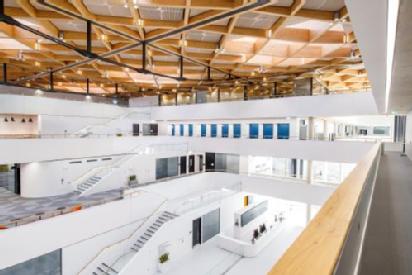 The Prof. Lord Bhattacharyya Building, home to the National Automotive Innovation Centre (NAIC) has won yet another award, this time at the 2020 Excellence in Design Awards, hosted virtually by the AIA UK Chapter on the 28 October. The awards were chosen from three overarching categories: Professional, Emerging Practice and Sustainability, a new category addition. The building scooped the Sustainability-Large Project category.
The Prof. Lord Bhattacharyya Building, home to the National Automotive Innovation Centre (NAIC) has won yet another award, this time at the 2020 Excellence in Design Awards, hosted virtually by the AIA UK Chapter on the 28 October. The awards were chosen from three overarching categories: Professional, Emerging Practice and Sustainability, a new category addition. The building scooped the Sustainability-Large Project category.
This comes shortly after the building was recognised as one of the best workplaces in the Midlands and Central England at the annual British Council for Offices (BCO) regional awards, winning the British Council for Office Midlands and Central Innovation Award.
Based at the University of Warwick, NAIC was officially open on 18th February 2020 by HRH The Prince of Wales. The Centre is a partnership between WMG, University of Warwick, Jaguar Land Rover, and Tata Motors, and is the largest of its kind in Europe and is well timed, arriving when a global mobility revolution is underway, with a new age for transport mobility.
A beacon for automotive research it brings together the brightest minds from industry and academia, to develop future vehicles and mobility solutions. It is home to up to 1,000 staff working across design, engineering and research, as well as future engineers on degree programmes.
Designed by Cullinan Studios the brief for the Centre was for simplicity and strength of purpose, turning a complex assembly of spaces into an immediately legible building.
